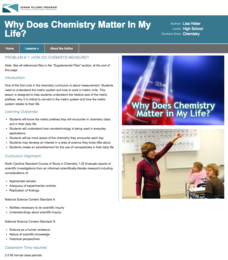Curated OER
Fingerprinting Lab
High schoolers recover latent prints by iodine fuming, cyanoacrylate fuming, and dusting with powder, after a lecture/discussion on fingerprinting techniques. They each provide a fingerprint for identification by another student. A...
Curated OER
Chemical Consequences of Burning Fossil Fuels
Future scientists are introduced to the chemical consequences of burning fossil fuels, learning that fossil fuel combustion leads to the formation of oxides of three nonmetals: carbon, nitrogen, and sulfur, all of which end up in the...
Curated OER
Sour and Bitter: Acids and Bases
Tenth graders distinguish between acids and bases. In this pH lesson, 10th graders view a PowerPoint and discuss the characteristics of an acid and a base. They investigate natural substances to determine the pH level of each.
American Chemical Society
Development of Baking Powder
Did you know baking powder can be used to treat acne, whiten teeth, and make sugar cookies? The activity on the development of baking powder is ready-to-go with no preparation required. Through readings, pupils answer questions, complete...
American Chemical Society
Joseph Priestley, Discoverer of Oxygen
Do you want to hear a joke about nitrogen and oxygen? NO. We all know there is oxygen in the air and that plants produce oxygen, but how was it discovered? Scholars read a handout, answer questions, and analyze material in the...
Cornell University
The Galvanic Cell Game
Play a little game with your classes! Young scholars expand on their understanding of oxidation/reduction reactions in a game-based activity. They build a Galvanic cell with game pieces while learning about each component and their...
Kenan Fellows
Density
Most scholars associate density with floating, but how do scientists determine the exact density of an unknown liquid? The third lesson in a seven-part series challenges scholars to find the mass and volume of two unknown liquids. Each...
Kenan Fellows
How Do Chemists Measure?
Young chemists create gold nanoparticles as they learn to measure accurately with the metric system. They create an advertisement for the application of nanotechnology to complete the first lesson in a series of six.
Curated OER
An Electro-Olympic Event: Lemon vs. Lime
Students design a battery, identify and label the anode, cathode, electron flow, ion flow, oxidation & reduction reactions, chemicals used including the location of each;and distinguish between anode materials with regard to energy...
Curated OER
Designer Colors, an Inquiry Approach to Flame Testing
Students investigate the spectroscopic colors unique to elements, and to use this information to create a specific color. They follow a detailed schematic to produce a spectroscpoe to be used in the testing.
Curated OER
Investigation of Crystallinity in Polymeric Materials
A kaleidoscope is constructed using polarizing polymer paper and then low-density polyethylene, high-density polyethylene, and polypropylene are all melted onto individual glass slides and examined through a microscope. The intent is to...
Curated OER
What Is Special About Polyethylene Food Storage Bags?
Students participate in an investigation in which they compare a polyethylene bag designed for recycling or disposal with a polyethylene food storage bag. Students use hexane to determine the differences between the low density...
Curated OER
#17 Determining the Accuracy of Selected Laboratory Glassware
Students calculate the volume of a specific mass of water placed in selected pieces of common laboratory glassware, using the density formula. They then determine the accuracy of the volumetric measurement for selected pieces of...
Curated OER
In Touch with Apples
Students read "How To Make an Apple Pie and See the World", the story of a girl who traveled the world to find the ingredients to make her apple pie. They conduct a series of interdisciplinary activities including testing their senses,...
Curated OER
Sunrise/Sunset
Third graders discovver what causes the dramatic colors of a sunset by seeing the changing color of light as it passes through a clear container of water to which milk is gradually added. They measure the liquids and observe what happens...
Cornell University
Build a Fuel Cell
Discover the connection between redox reactions and fuel cells. Collaborative groups build a Hoffmann Apparatus that demonstrates the electrolysis of water and then convert their models into a fuel cell. They use their fuel cells to...
Other popular searches
- Organic Chemistry
- Chemistry Chemical Reactions
- Chemistry Periodic Table
- Chemistry Equations
- Chemistry of Life
- History of Chemistry
- Chemistry Lesson Plans
- Organic Chemistry Projects
- Food Chemistry
- Chemistry Current Events
- Chemistry of Soap
- Water Chemistry

















